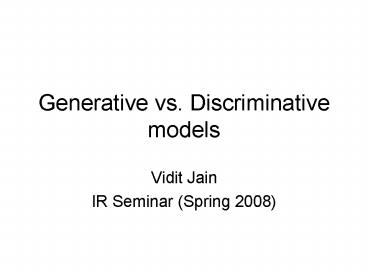Generative vs' Discriminative models - PowerPoint PPT Presentation
1 / 12
Title:
Generative vs' Discriminative models
Description:
Asymptotic results for these models (Ng & Jordan) Relevance of ... Perplexity. Model. People as topics (Jain, ICCV07) Purely Generative ~25. MRF. 65.24. SHRF ... – PowerPoint PPT presentation
Number of Views:110
Avg rating:3.0/5.0
Title: Generative vs' Discriminative models
1
Generative vs. Discriminative models
- Vidit Jain
- IR Seminar (Spring 2008)
2
Readings
- Required
- Ng and Jordan. NIPS01
- Nallapati. SIGIR04
- Lafferty Zhai. Workshop on language modeling
and IR, 2001. - Required Skims
- Jain et al. CVPR08
- Jain et al. ICCV07
3
Readings (contd.)
- Recommended
- Wei and Croft. RIAO07
- Cao et al. SIGIR06
- Raina et al. NIPS04
- Others
- Metzler. Tech Report, CIIR
- Jaakkola and Hausler. NIPS98
- Ulusoy and Bishop. CVPR05
- Long and Servedillo. COLT06
4
Agenda
- Asymptotic results for these models (Ng Jordan)
- Relevance of these results in the context of IR
- Language models as generative models (Lafferty
Zhai) - Topic models (Wei)
- Discriminative models for IR (Nallapati)
- IR as classification
- Is the paradigm choice task / evaluation
dependent? - vision (Jain), ranking (Metzler)
- Hybrid models
5
Ng Jordan (NIPS01)
- Generative models have better performance than
discriminative models for less data, but the
asymptotic error is higher for the former. - Is it true for any pair of models?
- VC-dimension of a classifier vs. the complexity
of the problem. - Does smoothing change anything?
6
Relevance for IR
- Is generative modeling always preferable for IR
tasks ? - Less data
- Can we compress representation / feature space?
- Expansion of representation ?
- Effect of smoothing
7
Lafferty Zhai
- Relevance models and language models are
probabilistically equivalent but different from
statistical point of view. - Assumptions for language models
- Dr and Qr are independent.
- D and R are independent.
- Independence of query terms.
- Incorporating relevance judgments in the two
models.
8
Wei and Croft, RIAO07
- Vocabulary mismatch
- User context
- Manually-built ideal topics why is it the
best? - Topic model construction
- Results not good mostly because of the
ideal-iness. - Analysis
9
Discriminative models
- Is IR classification?
- Reasoning for language models being generative
not complete. - Benefits for discriminative
- Expressiveness, burstiness, arbitrary features,
relevance. - Results analysis
- Is the comparison fair?
10
Paradigm choice
- Evaluation task dependent
- Metzlers observations
- IR not concerned with accuracy or likelihood
- Direct optimization of the evaluation metric
11
Task dependent (Vision papers)
People as topics (Jain, ICCV07)
Event Classification (Jain, CVPR08)
12
Hybrid models
- Use hybrid models to use benefits of both types
of models. - Time-dependent learning parameter ?
- Over-sampling weight ?
- Hybrid optimization functions ? (Raina, Ulusoy )

